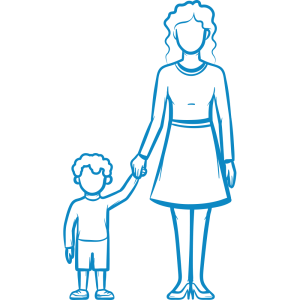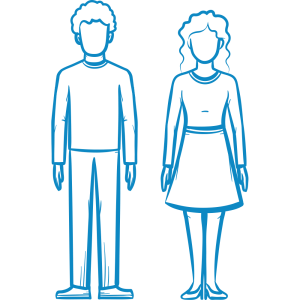Psychopathy Signs
A sign is an objective, observable phenomenon that can be identified by another person.
This information should not be used to diagnose or treat. It is not meant to take the place of consultation with a healthcare professional. If you have concerns, you should contact your healthcare provider for a screening.

PRESCHOOL (AGES 2-4)
- Unusual risk taking, showing little fear in dangerous situations
- Doesn’t look at others’ eyes or faces as much as their peers do
- Doesn’t react when others are scared or sad

EARLY CHILDHOOD (AGES 5-10)
- May seem “cold” or not show affection
- Misbehaves more than peers, including lying, stealing, breaking rules, tantrums, or aggression
- Doesn’t seem to care about consequences like getting a time-out or having privileges removed

ADOLESCENCE (AGES 11-17)
- Doesn’t feel bad or guilty after doing something wrong
- Doesn’t seem concerned about other people’s feelings
- Acts or feels superior to other people
- Has difficulty keeping friends
- Doesn’t seem to care about performance in school
- May engage in illegal activities

ADULTHOOD (AGES 18+)
- Callous or uncaring in response to others’ suffering or distress
- Does not show remorse after hurting others or breaking rules
- Lies often and skillfully
- Manipulates people to get things
- Engages in risky or dangerous activities
- Tends not to plan ahead, leaves things until the last minute
- Irresponsible, fails to keep promises or follow through with plans
- May be superficially charming
- Doesn’t seem to care about performance at school or work
- Brags frequently
- Has trouble maintaining relationships, including friendships and romantic relationships
- May engage in violent or illegal behavior
Because psychopathy is a spectrum disorder, early signs of psychopathy vary widely. Some children show hints as early as 2 or 3 years of age. In other children, signs do not appear until they are older. Signs may emerge before age 2 in some children. But there is not yet enough data on psychopathy in very young children for these signs to be used for screening purposes.
Not all children with psychopathy show all the signs. And many children who don’t have psychopathy show some of these signs. That is why it is essential to be evaluated by a professional.
If you have concerns, you should contact your healthcare provider for a screening.
You can also complete an online screening. Validated screening tools for psychopathy include the TriPM (Triarchic Psychopathy Model) and ICU (Inventory of Callous-Unemotional Traits). The TriPM can help determine if an adult shows signs of psychopathy. The ICU can help determine if a child has callous-unemotional traits, which are the core social and emotional risk factors for psychopathy. These short online screeners take only a few minutes to complete.
Please consult our available resources for more information:
The content below contains advertisements that help support the work of Psychopathy Is, but are not created or endorsed by our organization.
